Nifedipine
Uses
Nifedipine is used in the treatment of angina (heart-related chest pain), hypertension (high blood pressure), arrhythmia, heart attack, hypertensive emergency, subarachnoid hemorrhage, stroke, and anal fissure.
How it Works
How Nifedipine works Nifedipine is a calcium channel blocker. In cases of high blood pressure, it normalizes blood pressure by relaxing the blood vessels, which reduces the pressure on them and improves blood flow throughout the body. The increased blood flow further relaxes the heart muscles by decreasing the workload on the heart. Additionally, it enhances oxygen delivery in the body, thereby preventing heart-related chest pain.
Side Effects
Common side effects of Nifedipine include dizziness, fatigue, flushing (a sense of warmth in the face, ears, neck, and trunk), headache, and peripheral edema.
Expert Advice
- Take Nifedipine at the same time every day to help you remember to take it.
- A sudden drop in blood pressure may occur, especially when you first start taking Nifedipine.
- To reduce the chance of feeling dizzy or passing out, rise slowly if you have been sitting or lying down.
- Nifedipine may cause ankle or foot swelling.
- To alleviate swelling, raise your legs while sitting down.
- Consult your doctor if the swelling does not go away.
- Nifedipine may cause dizziness.
- Do not drive or engage in activities that require mental focus until you know how Nifedipine affects you.
- Inform your doctor if you are pregnant, planning a pregnancy, or breastfeeding.
- You have been prescribed Nifedipine to improve your blood pressure and/or to reduce the number and severity of angina attacks.
- Lowering blood pressure reduces the risk of future heart attacks and strokes.
Related Medications
Nifedipine 10mg

₹15
₹12.1
MRP ₹15.5
Nifedipine 20mg

₹15.8
MRP ₹22.5
Nifedipine 5mg

₹35.1
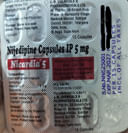
₹27
MRP ₹32.9
Nifedipine 5mg

₹43.8

₹27
MRP ₹32.9
Nifedipine 30mg

₹15.1
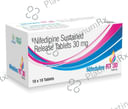
₹83.7
MRP ₹164.1
Nifedipine 30mg
₹143

₹83.7
MRP ₹164.1
Nifedipine 30mg

₹259.3

₹83.7
MRP ₹164.1
Nifedipine 10mg

₹14.2

₹11.9
MRP ₹16.1
Nifedipine 10mg

₹25.8

₹11.9
MRP ₹16.1
Nifedipine 10mg

₹20

₹11.9
MRP ₹16.1
Nifedipine 10mg

₹12.6

₹11.9
MRP ₹16.1
Nifedipine 20mg
₹7.9
MRP ₹12.9
Nifedipine 20mg
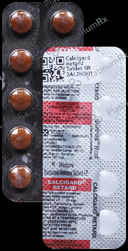
₹47.9
₹7.9
MRP ₹12.9
Nifedipine 30mg
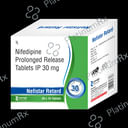
₹214

₹83.7
MRP ₹164.1
Nifedipine 20mg

₹12.5
₹7.9
MRP ₹12.9
Nifedipine 20mg

₹14.8
₹7.9
MRP ₹12.9
Nifedipine 20mg

₹32.1
₹7.9
MRP ₹12.9
Nifedipine 20mg

₹8.5
₹7.9
MRP ₹12.9
Nifedipine 30mg

₹90

₹83.7
MRP ₹164.1
Nifedipine 10mg
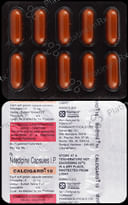
₹272.2

₹11.9
MRP ₹16.1
Nifedipine 30mg

₹267.3

₹83.7
MRP ₹164.1
Nifedipine 5mg

₹9.7
Nifedipine 5mg

₹11
Nifedipine 10mg

₹9
Nifedipine 20mg

₹14
Flat ₹100 off on first app order | Use Code: APP100 |
Flat ₹100 off on first app order
USE CODE: APP100

Download Now